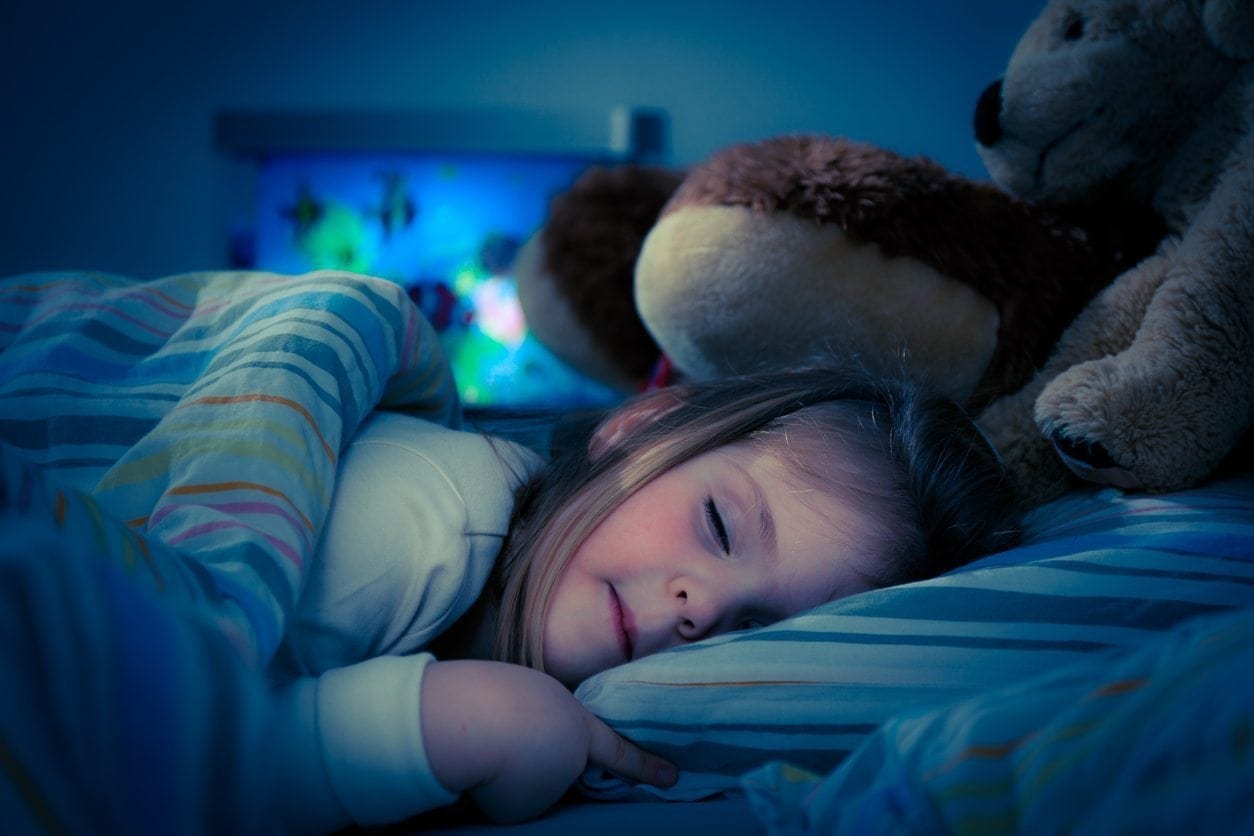Does your toddler or young child wake up crying or distressed, and you don’t know why or can’t quickly soothe them? It can be scary and leave you feeling powerless if your little one has ever had a night terror. They can be dramatic wake-ups, or your child might be distressed or disturbed and hard to settle. Although they both involve sleep, a night terror is not the same thing as a nightmare. There are things you can do to help console your child after a nightmare or even prevent it from happening, but the same can’t be said for night terrors. We will explore what the differences are, as well as some coping strategies if your baby wakes up screaming from a night terror.
A night terror, also sometimes called a sleep terror, is an actual sleep disorder and part of a class of sleep disorders called “parasomnias.”1,2 It occurs typically during the first few hours of sleep and happens during non-rapid eye movement (NREM) sleep. It can last up to 10 minutes and causes feelings of panic and distress.2
Night terrors in children occur most commonly between the ages of 4 and 12; however, they usually decrease in frequency as children grow up.3 If your child experiences one, they will wake terrified, and they can scream, shout, and move about, but they will also experience things like increased heart rate, faster breathing, and sweating.4 They might even be moving around and engaging with you, but they aren’t having a dream, and they aren’t actually talking to you. After the night terror, your child will seemingly go back to sleep, and they won’t remember anything in the morning.
Although they might sound similar to nightmares, night terrors are entirely different. As mentioned, they are a formal sleep disorder and happen during NREM sleep, whereas a nightmare is a dream that brings up big feelings or an emotional response. Nightmares also occur during a different stage of sleep — rapid eye movement (REM) sleep — and tend to happen later in the night.5
Night terrors in children are something that just happens, but many things can influence nightmares. For instance, they may experience changes or stress (like moving to a new house, getting a new sibling, starting school, etc.) or see something on TV or in a book that scares them.6 Nightmares can even be influenced by anxiety or worries; this includes normal fears that happen during the day, such as seeing a spider or having to talk in class. A nightmare can be a normal way that children process and sort through things that are happening in their world.7
More often than not, night terrors aren’t something in your control, and there is some evidence that night terrors are genetic (meaning they can be passed down in families).8 Some research says certain health conditions like nocturnal asthma, reflux, or particular medications might have some influence, too.8 Finally, overall health can play a role, with night terrors being more common in those who don’t have a proper diet or good quality sleep.9
It’s important to know that although they look upset or distressed, they aren’t having a nightmare and aren’t responding to things around them (nor will they remember things the next morning), so you can’t comfort them per se. However, there are several things you can do to help your child during a night terror, including:9,10
- Don’t wake them: This can add to the confusion or create disorientation or distress, and your child won’t remember it the following day anyway. Leave them to sleep, and it will be over much quicker.
- Keep them safe: Make sure if they are moving about that you keep them out of harm’s way. You might stay close by and monitor them or move things they could trip on or other hazards. You can also lock the front door and remove anything sharp they could accidentally hurt themselves on.
- Take them back to bed: Try to wait for them to start settling down, or if you can, redirect them back to bed. Don’t try to talk or negotiate with them; they might look awake and responding, but they aren’t really “awake” or present and won’t understand what you are trying to do.
It’s a bit of a waiting game, as most children grow out of night terrors without any intervention or support.11 It is essential to make sure they are safe during a night terror and ensure you don’t wake them. But the most effective treatment is helping your child improve their sleep. You could look into some potential causes, like health issues, diet, or sleep quality, and see if you can make any adjustments. For example, establishing a good nighttime routine and ensuring they don’t watch TV directly before bed or have sugary, caffeinated drinks can help them settle into a better-quality sleep.11
If you are concerned about your child’s night terrors, it’s important to seek support from your doctor or other trusted health professional. You could arrange a sleep study to find out precisely what is happening or even explore medication options (however, medication is not often prescribed for night terrors).
We can’t prevent night terrors, especially if they are genetic. However, you can set your child up for restful sleep by ensuring there are no underlying medical concerns and putting strategies in place to improve their quality of sleep.
Remember that night terrors can be a regular part of development, and they do occur in healthy, happy children. Despite this, night terrors and nightmares can be frightening (for our little people and us). While night terrors might not harm our children, it’s essential to address them and explore your child’s experiences with a pediatrician or your family doctor.

 PARENTING TIPS
PARENTING TIPS PREGNANCY
PREGNANCY BABY CARE
BABY CARE TODDLERS
TODDLERS TEENS
TEENS HEALTH CARE
HEALTH CARE ACTIVITIES & CRAFTS
ACTIVITIES & CRAFTS


